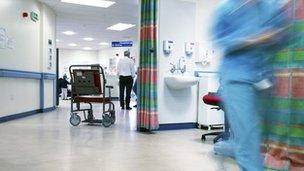Welsh government bid to strengthen use of Welsh in health and social care
- Published

Concerns have been raised that targeting Welsh-speaking staff could hinder recruitment
Moves to strengthen the use of the Welsh language in health and social care - previously criticised by a doctors' group - are being unveiled.
The Welsh government wants Welsh speakers to be able to express their health needs in their first language.
But the British Medical Association (BMA) has said the Welsh language should not be a priority when delivering health care.
The strategy is being launched by the Welsh government on Wednesday.
The BMA said it was in favour of the Welsh language but felt that money spent on the NHS should be spent on health care.
Concerns have also been raised that targeting Welsh-speaking staff could hinder recruitment.
But Health Minister Lesley Griffiths said the Welsh government wanted to make sure patients and their families felt they were "able to use Welsh when being assessed and receiving treatment or care".
"We all feel more comfortable discussing personal health and emotional matters in our first language," she said.
"This framework is a key step to increasing not only the physical and mental wellbeing of Welsh speakers who need access to health and social care services, but also their emotional wellbeing."
Gwenda Thomas, deputy minister for social services, said many Welsh speakers could only express their care needs effectively in Welsh.
"For example, people suffering from dementia and people who have a stroke often lose a grasp of their second language," she said.
"Children under the age of five can often only speak their first language."
The strategy says the challenge of addressing the shortage of Welsh speaking staff must be overcome.
"It is no easy task and requires strong leadership from human resources departments," it said.
"It is worth considering whether language skills could be identified in the same way as gender balance is considered within staff teams in service areas such as home care, stroke and dementia services."
Cymdeithas yr Iaith (the Welsh Language Society) supported the plans and said during the consultation that the BMA had to realise that "not being able to express yourself and therefore potentially not receiving the appropriate treatment is the same as other examples of bad service - like not being able to have a hospital bed or a shortage of staff".
Welsh language commissioner Meri Huws has backed the "fundamental principles" of the scheme saying it was a "valuable opportunity to reinforce Welsh language services in those areas".
However, she also raised some concerns such as questioning whether there was a "strong enough long-term foundation" because the strategy worked on the basis of three-year action plans.
- Published17 May 2012
- Published16 May 2012